Tulku Ponse Yigme Tenzin has been recognized as the reincarnation of Lopon Sangye Tenzin, the teacher of Yongdzin Tenzin Namdak and the first Lopon of Menri monastery. How did it happen and how does he feel about it nowadays when he is twenty-six years old?
You met the Yungdrung Bon at a very young age and in very unusual circumstances: you were recognized a tulku, a reincarnated lama, as a new-born child. Can you explain how it happened?
My parents were both catholics – Mexico is a catholic country – but they did not feel quite comfortable with this religion, and they had this in common when they met. They had lots of questions and were not satisfied with the answers they got. Also, they felt there was no method to do anything, as if you are just supposed to pray for things to happen but there is nothing you personally can do to make it happen. These dissatisfactions led them to search for some other source of spirituality. Those years, Namkhai Norbu Rinpoche used to come to Mexico to give teachings on Dzogchen every year. I do not know how my parents got interested in this kind of teaching, they had found out somehow.
In 1995 Namkhai Norbu was sick and he recommended to the local organizers to invite Tenzin Wangyal Rinpoche instead. They followed the advice and Tenzin Wangyal gave a teaching in Mexico City in May that year. My parents could not go but two people of their hometown, Chihuahua, went to the event and when they were back home, they said to my parents that they liked the teaching very much and that they invited Tenzin Wangyal Rinpoche to teach in Chihuahua the following year, and that he accepted, to their surprise. They had no experience with organizing retreats and also little financial resources so they were a bit worried about how they would manage. My parents reassured them that they would help: they bought the flight ticket for the lama and offered to host him at their place. Tenzin Wangyal Rinpoche came to our home in September of 1995. It was the first time my parents met him and connected with Bon.
It was Tenzin Wangyal Rinpoche who indicated you as a tulku, right?
Yes. He arrived in Mexico the following year, in September 1996. I was born one month earlier. He stayed again at our house and told my parents that before coming he had dreams in which Lopon Sangye Tenzin, who was also his teacher, appeared to him dressed in Western clothing and told him he was going to reincarnate in the West. Later on he had more dreams which led him to think that his teacher would reincarnate in our family. At the same time my mother started to have unusual dreams as well. She practiced guru yoga a lot and got very connected to this practice.
Lopon Sangye Tenzin Rinpoche was the first lopon, or head teacher, of Menri Monastery in India. Born in 1917 into the Jyab ‘Og family, an esteemed lineage within the Bön tradition, he lived his early years in the nomadic region of Hor, Tibet. He studied for many years in the Drepung Monastery of the Gelug tradition, as well as under masters of other schools of Tibetan Buddhism. He became an accomplished master of sutra, tantra and dzogchen. He lived a simple life, much of it in solitude, yet he was considered by many to be the greatest Bön scholar of his generation.
Source: www.Ligmincha.org
Tenzin Wangyal said to us that he informed Yongdzin Rinpoche and Menri Trizin about those dreams since they were the only authority which could confirm that the dreams were carrying an authentic message. They both were a bit skeptical about it because it did not make sense to them why Lopon Sangye would reincarnate in Mexico, instead of Nepal or India. But the dreams contained some convincing signs and so both Yongdzin Rinpoche and Menri Trizin started to look for signs themselves.
In February 1997, when I was six months old, Tenzin Wangyal Rinpoche organized a trip to Menri monastery which my father joined. One day, when they were already in Menri, it was raining and my father found a shelter on the porch of a building of the monastery. He did not know that the building was the house of His Holiness Menri Trizin. When it stopped raining, His Holiness came out and asked my father: “You are Jorge Valles, aren´t you? I just came out of a three-day long meditation where I was asking for signs, and you are the first person I met after I left, and you see, there is not one, but two rainbows in the sky, stretching from east to west.” This is how my father tells the story. Also, His Holiness pointed out to a cuckoo sitting on a tree nearby, which is considered another auspicious sign.
At that point, did the lamas and the family accept the reincarnation as a fact?
Yes, they did. And when I was three years old, I went to Menri Monastery and Triten Norbutse to be enthroned as a tulku, I took refuge and received my Tibetan name.
This must have turned the life of your family upside down.
I think my parents together with Yongdzin Rinpoche and His Holiness handled everything wisely. Traditionally, when a tulku is recognized the family gives the child to the monastery at the age of two or three. My parents did not want to do this. They agreed to having lamas around their son and accompanying him to the monastery for a certain period every year, but before agreeing to more than that they wanted to wait until my discernment was strong enough so that I could decide if this is what I wanted.
I remember that when I was nine, I spoke with Yongdzin Rinpoche during my stay at Triten Norbutse, and he said to me: “How about spending a year at Menri after you finish middle school and before going to high school?” And this was what we, my parents and I, decided to do. As I said, when I was twelve, I went alone to the monastery for the first time and stayed there for the whole year.
I think this was a good approach which avoided risks that this condition could have brought. I read a book about tulkus born in the West. Most of their families followed the traditional Tibetan way and delivered the little child to the monastery, but when they became teenagers, they dissociated themselves from it all and wanted to go back to the West and live a normal life. They felt like someone stole their childhood from them. And this happens not only to the Westerners, but sometimes to Tibetan tulkus too.
His Holiness Menri Trizin and Yongdzin Rinpoche also emphasized that I needed a good secular education as well. When I finished the year´s stay in the Monastery, His Holiness told me: “Now you go to Mexico and finish all your studies. Go, play, enjoy life there and then come back and continue your studies.”
Do you think that being a tulku has helped your development as a human being and as a practitioner?
Yes, I think so, although in some periods of my life I had my doubts about all these things, especially as a teenager. I was thinking “what do I want to be in the future?” Being a tulku seems so much out of “Western” context, I would say. I felt that the responsibilities and expectations were sometimes heavy, I felt overwhelmed with all that pressure. People coming and telling their stories of how they have a good connection with me… Also, the assumption that I would become a teacher, assuming that I must become one. The pressure was pushing me on the wrong side, putting a question in my head “what if I do not become good enough?”. But when I engaged more deeply with the teaching, with a good knowledge of Tibetan, I started really to appreciate the opportunity to absorb all that knowledge. This tradition has an incredible insight in epistemology, the way we know things, how thought works… I like the philosophical aspect of the doctrine very much. It is uniquely profound, and unknown largely in the West.
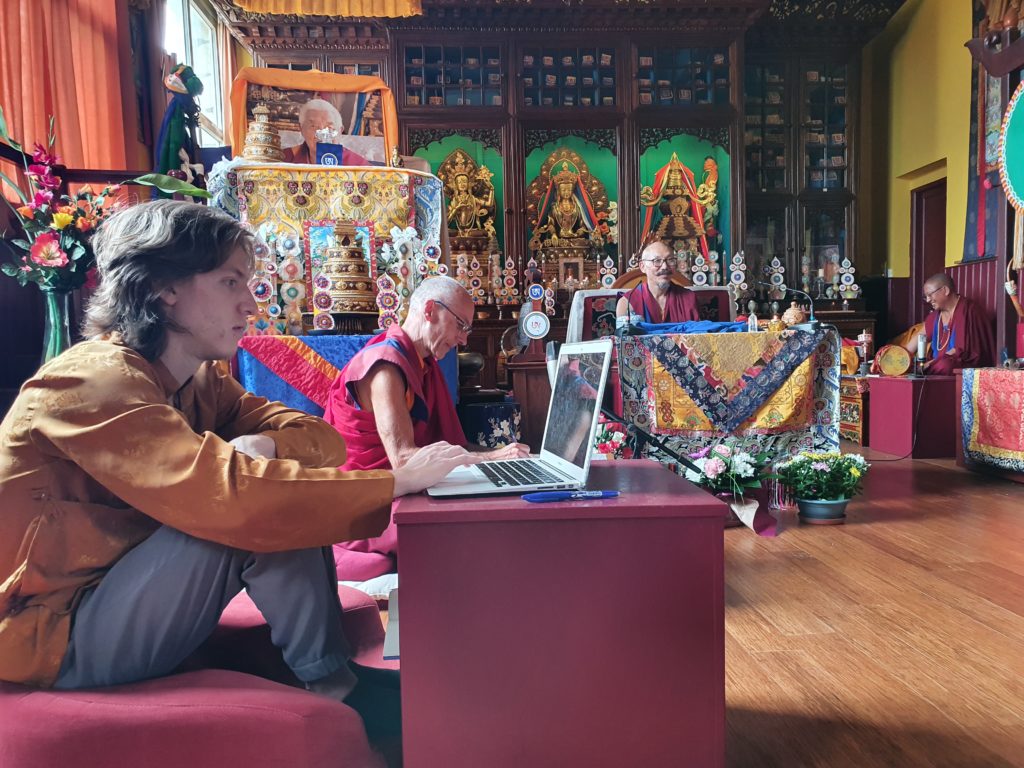
Is the institution of tulkus emphasized in the Yungdrung Bon tradition? My impression was it is less important in Bon than in other Tibetan schools.
It is only my opinion, I do not know much about it, but I think that the difference is that other Buddhist schools think that just by being born a tulku one has all the necessary favorable conditions, while Bon insists on the fact that you still have to create all the conditions. You have to study, you have to learn. You are a tulku by the name, but you have to earn it, to become it by heart. But I am not sure if this difference really exists. Being born as a tulku is a karmic seed that has to meet the necessary secondary conditions.
You chose to study financial administration at the university. Why not philosophy, or Tibetan studies? Was there any particular reason for it?
In Mexico no university offers Tibetan studies, so I would have to go to the US or Europe. Also, I was always very good at math, it was my favorite subject at school. That was one of the reasons. Another reason is that my father has a construction company in Mexico, he is an engineer by education. My sister and my brother have artistic inclinations, my brother studied cinematography, my sister is a fashion designer. Neither of them wanted to administer the family company when my father retires. It was always said that I would be the one who would run the family business and I was always ok with that. But it would not have been necessary to go to the university, I could have learned just by spending time with my dad.
There was another reason why I entered the university in 2015. It was my plan B. At that time, I was applying for a visa to India in order to go to the Lishu institute for three years, but the process was very difficult, the visa did not arrive, so I registered to the university to avoid wasting time in case I will not be given the visa at the end. I will have to study a lot in my life, and I did not want to lose a year. If I had got the visa, I would have got tuition fees back. Then, I went only for three months, because I did not get the visa for a longer period and continued to study financial administration. I cannot say that I did not like the studies, I liked them.
Besides that, both Yongdzin Rinpoche and His Holiness always thought that I should have a degree from a western university. Every time I went to see them, they asked about it. They were saying: “How is it going with your university? Have you already graduated? You have to graduate!”
What is your plan for the next decade?
I do not like planning too much ahead, especially since that time when I did not get the visa. I had a plan to go for a three-year course and it did not happen, which disappointed me a lot then. After that, I told myself I was not going to plan my life more than necessary, possibly just for one year at a time. Next year I want to go to Nepal and stay there for up to three years. After that, I would like to come back and start being more involved in the family company and in teaching the Bon to others. This is the plan, but I will see how things will turn out. The objective is to pursue my Bon studies and to work for the company at the same time. I have to see how to manage it. Besides that, I also would like to study philosophy at a university.
You are at an age when relationships and searching for a partner are very important. Is there space in your life for it?
I just came out of a relationship. We were together for almost one year and it was my second girlfriend. They both understood that this is what I am, and they knew that there would be a time when I would go to India or Nepal and spend a few years there. And when I am there, I usually shut my chat to avoid being distracted. When I was in India in the translators´ school, I deleted my social media and changed my phone number, because I really wanted to immerse myself in learning.
I personify the Bon tradition, the way I act is according to these teachings, I also want to be a teacher of Yungdrung Bon one day. My partner will have to agree with all that. So, if it is meant to happen, it will happen. I do want to have a son, my own or adopted one. The teachings often speak about the mother and the child and about a special, unique character of their love, and I want to experience this kind of love.
photos: Jitka Polanská
the second part of the interview:
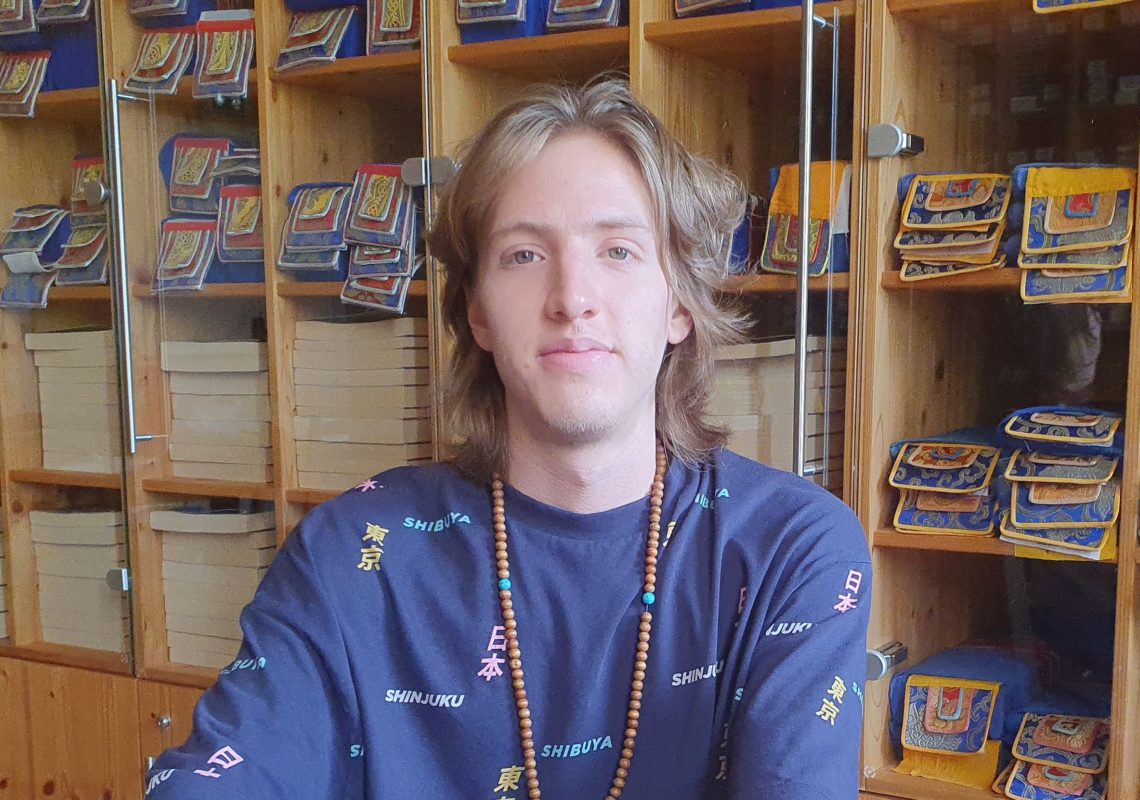




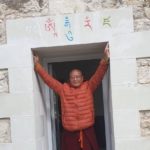

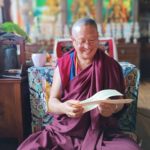
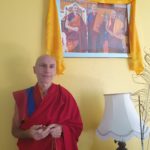




Robert Homoki
September 29, 2022 — 7:21 pm
Tashi Delek from Berlin, Ponse Yigme Tenzin Tulku La ! !
Yungdrung Bön ! Be very Welcome any time !
We are a small Sangha in a big City and you would like it here. Thank you for your openness. Robert (53)